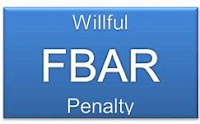According to Law360, the estate of a dual U.S.-Canadian citizen owes penalties of more than $157,000 for her failure to disclose accounts in Canada and New Zealand, the U.S. Court of Federal Claims ruled in Flint et al. v. U.S., case number 21-1202, in the U.S. Court for Federal Claims.The court found on August 23, 2022 that Margaret J. Jones failed to file the required disclosures of foreign bank and financial accounts for more than $3 million kept in Canada and New Zealand, where her husband was born.
Judge Marian Blank Horn threw out claims by Jones' estate for breach of contract and illegal extraction, rejecting arguments that the U.S. government violated an agreement with her over the acknowledgement of the funds.
After Jones' husband died in 2011, she admitted in her tax filings that the foreign accounts existed, according to court filings. In an effort to pay the money she owed, Jones enrolled in an Internal Revenue Service program known as the Streamlined Domestic Offshore Procedures. Designed to encourage disclosure of previously undisclosed offshore accounts, the program allows participants to work with the IRS to come into full tax compliance.
After Jones' husband died in 2011, she admitted in her tax filings that the foreign accounts existed, according to court filings. In an effort to pay the money she owed, Jones enrolled in an Internal Revenue Service program known as the Streamlined Domestic Offshore Procedures. Designed to encourage disclosure of previously undisclosed offshore accounts, the program allows participants to work with the IRS to come into full tax compliance.
Jones' Estate Said The IRS Then Used This Self-Disclosure To Impose An FBAR Penalty Of $157,000 For Failing To Disclose The Existence Of The Foreign Bank Accounts.
The accounts date back nearly six decades to when Jones' husband began placing funds in them, around the end of World War II. By the time the IRS caught up, they held millions across 11 accounts, according to Tuesday's ruling.
Jones knew about the accounts but never told her tax preparer, the government said, indicating that she was willfully attempting to hide the assets. It therefore assessed a penalty even after she admitted to the existence of the accounts.
To qualify for the for streamlined programs, the IRS defines non-willful as “conduct that is due to negligence, inadvertence, or mistake or conduct that is the result of a good faith misunderstanding of the requirement of the law.”
The court was unpersuaded by the claims that Jones was tricked by the government. Judge Horn said the government had not in fact changed its position, and noted that the contract specified that the taxpayer may have to pay penalties if found to have deliberately hidden assets.
Have an FBAR Penalty Problem?
Contact the Tax Lawyers at
Marini& Associates, P.A.
for a FREE Tax Consultation at:







No comments:
Post a Comment